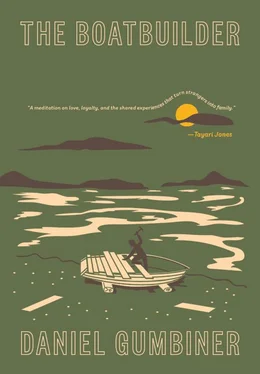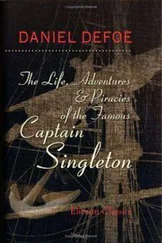Once inside the bay, all three of them squeezed into the dory and rowed to shore. They pulled the dory up onto the beach, its bottom scraping against the sand, and then they began to hike east into the estuary. Winter was still holding on, it seemed, and the sky was moon-white and pockmarked. Along the shore delicate herons stood knee-deep in the water and, in the distance, rows of oyster racks lay exposed in the low tide. Berg knew there was some kind of controversy about the oyster farm in Estero but he hadn’t paid close attention to it.
While they were walking, Uffa mentioned that he was thinking about going back to school.
“For what?” Alejandro asked, skeptically.
“MFA,” he said. “Get an MFA in poetry.”
Alejandro took a blue bandanna from his pocket and wiped his nose.
“You don’t approve,” Uffa said, watching him. “I know.”
“Do you want to be a poet?” Alejandro asked, shoving the bandanna back into his pocket.
“I like writing poetry,” Uffa said.
“But where does it lead you?” Alejandro said. “I don’t see the value. The best that can happen is that you create a cult of personality.”
“Are you kidding?” Uffa said. “I totally disagree. It’s art. Art is important. You practice an art yourself.”
“Yes, but it has a practical application.”
“Delivering drugs?”
“I’ve been building boats for years, Uffa, and the boats have been used for all different sorts of things: fishing, traveling…”
“I know, but I mean, c’mon, Ale. Poetry is exciting. It’s beautiful.”
“I know it’s exciting. I’ve no doubt it’s exciting,” Alejandro said. “But it’s a dead end.”
The two of them continued to argue in this fashion for the next several minutes. Alejandro saw poetry and writing as leading to madness. It could only be made on luxury time, he argued, could only be created out of profound boredom. To Alejandro’s mind, poetry distracted from the real work that needed to be done. As an artist, in the best-case scenario, all you did was cultivate your persona. You were left with nothing except an image of yourself as the poet and then you were dead.
“I would rather be in the world,” Alejandro said. “That is what I find beautiful. I’ll take the life of the peasant. Poetry is just empty sophistication. And sophistication is how we got into this whole mess in the first place.”
“I think it’s useful,” Uffa said.
“It leads toward madness in the end, Uffa.”
“That’s what happened to Szerbiak. That’s not what’s going to happen to me.”
“I never said anything about Szerbiak.”
“I know you didn’t.”
Berg had never heard Alejandro articulate his positions on poetry but he was not surprised by them. Alejandro held extreme views about many things. He believed the American empire was crumbling, and in a sense, he had moved his family to the country to build his ark and raise his children by the bay. Still, there was something hard in his voice when he argued with Uffa about poetry, something defensive and pained. Berg had the sense that he only half-believed the things he was saying, which was rare for Alejandro, who usually spoke with conviction. For a moment, Berg began to doubt Alejandro, to doubt his entire reality. Was he just some bitter old hermit? Or was he worth listening to, worth looking up to? The arguments he was making were logical, but they seemed cruel.
Berg had seen pictures of Alejandro with the young Szerbiak. This was when the two of them were both living in Colorado, fresh out of college. Alejandro was working as an anthropologist and Szerbiak was working on his first novel. There was a copy of that book on Alejandro’s bookshelf. Szerbiak had signed it and written a long inscription. Berg didn’t know what had happened between the two of them. He knew that Szerbiak had died a long time ago, after years of drinking.
When Berg first began to get to know Alejandro, he had the sense that Alejandro and his family had existed in this fashion for all of time. There was something eternal about them. Their life had such a clear rhythm, such steady purpose. It was hard to imagine them being anything other than the people he’d encountered when he first arrived. And yet, clearly, they had forged this world from something altogether different. They had inhabited different existences in different times. All you had to do was look at that picture of Alejandro and Szerbiak, the two of them dressed in sharp black suits, to know that, for Alejandro, many other lives had preceded this one.
THE WESTERN WAS LOCATED on the bay, next door to Gary’s Oysters and Vlasic’s Boat Works. Before settling into its present capacity as a bar, it had served, at different times, as a dry goods store, a horse stable, a brothel, a temporary jail, and a flophouse. It had swinging doors and a fireplace and pool tables that cost seventy-five cents a game. Uffa liked to go there because they served a chi chi, which was the only alcoholic beverage he ever drank, a sweet rum cocktail that tasted like ice cream.
Uffa usually drank his chi chi within two minutes but today he was slipping it slowly. Berg was drinking a beer. To their right a woman was talking about the great deal she got at an outlet store: 50 percent off, when all was said and done. She’d had many coupons. Berg didn’t know anyone here. The Western and the Tavern seemed to have entirely different clientele, even though they were owned and run by the same family. In front of them, on the screen above the bar, there was a college football game. Mississippi was upsetting LSU. The LSU quarterback kept shaking his head, squirting himself in the face with his water bottle.
“You know,” Uffa said. “I first came to Talinas because I had read about Alejandro in Szerbiak’s books.”
“He’s in Szerbiak’s books? Which ones?”
“The first two. I mean, he doesn’t feature prominently, but he’s in there. He’s the anthropologist they meet up with in Mexico.”
“Oh yeah, I think I remember him. I’ve only ever read the second one.”
“In one interview Szerbiak acknowledges that the character is based on Alejandro,” Uffa said. “Most of his characters were based on real people. And in that same interview, Szerbiak describes Alejandro as the most brilliant person he ever met.”
“Damn,” Berg said, impressed.
“Does that surprise you?”
“I guess not.”
“Doesn’t surprise me,” Uffa said. “Anyway, I had read about Alejandro in Szerbiak’s books and in that interview and I heard he was in Talinas and, you know, I was a sixteen-year-old journeyman-poet-loose-cannon… I thought I’d go pay him a visit. He ended up taking me in, teaching me how to build boats. This was back when he was still working with his old partner at Dillon Beach. Before he moved across the bay to this newer property.”
Behind them the swinging doors creaked. You always knew when someone was entering the Western because of its noisy doors. Berg and Uffa glanced over their shoulders to see who had arrived. It was a young ranch hand that neither of them recognized.
“I didn’t know it then,” Uffa continued, “but Alejandro and Szerbiak had fallen out of friendship years before Szerbiak’s death. Mostly because Alejandro was tired of taking part in Szerbiak’s bohemian shenanigans. He wanted to have a family and land and Szerbiak wanted to keep taking drugs and drinking and driving around in cars.”
“It’s hard to imagine Ale as a hedonistic young man, doing drugs in cars,” Berg said.
“But that’s what they did. And eventually, Ale got tired of it. I’ve heard him go off on that tangent about poetry being a dead end. I think it’s just fear. You know, he once told me that he’d never be able to write every day. ‘I’d never be able to do that, Uffa,’ he said. ‘I’d die.’ And I believe him. I think he’s terrified of it. I think he believes it destroyed his friend and I think it terrifies him. And then I have to stand there and listen to him shred poetry to pieces from some ideological high horse as though the two things are not remotely related.”
Читать дальше












